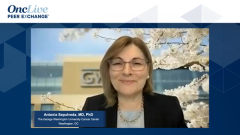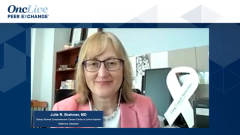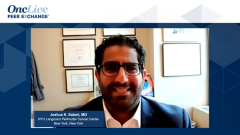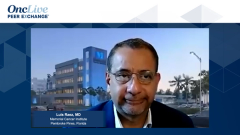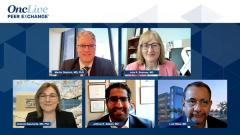
Strategies to Improve Biomarker Testing in NSCLC
Experts on non–small cell lung cancer discuss strategies to improve molecular testing and opportunities for community physicians to reach out to expert oncologists for clinical insights.
Episodes in this series

Transcript:
Martin Dietrich, MD, PhD: Dr Sabari, you’re seeing a lot of second opinions in your practice. What do you see coming in? What testing strategies could you describe and maybe improve? What is a message that you think would carry back to make sure that those second opinions yield the best possible recommendations from your end doing both a lot of standard of care as well as a large research trial program?
Joshua K. Sabari, MD: I think the key thing is that if you don’t test, you’re not going to identify an alteration that could benefit your patient. It’s not just about survival here. Most of these targeted therapies have survival benefits for them, but it’s also quality of life. And when I talk to some of the community oncologists that I work closely with, they say, “Josh, I’ll just get chemotherapy and immunotherapy up front, I’ll wait for my results in the second-line setting.” We now have data that if you give the wrong therapy up front, you may prevent the patient from receiving better therapy down the road and may affect their outcomes with that therapy down the road as well. For example, if you get PD-1 or PD-L1 inhibitor in the frontline setting and you have an EGFR mutation, not only does that medicine not work well, but then when you do go on to the correct medicine, a third-generation EGFR TKI [tyrosine kinase inhibitor], you have significantly increased immune-related adverse events, things like colitis, pneumonitis, and others. It’s really important to use your best therapy first. Unfortunately, oftentimes our patients don’t make it to later lines of therapy. I think reflex testing at your institution, if feasible, is the best way because it takes the onus off the individual clinician.
Another thing is to have molecular tumor boards at your institution or be part of a molecular tumor board if that’s not part of your institution. ASCO [American Society of Clinical Oncology] has great molecular tumor boards. If you’re thinking about this, if you’re looking for these alterations, if you have an outlet to discuss them—I do that commonly with you, my colleagues, and friends—it’s important to be able to understand that not everybody knows every alteration, and not everybody knows the best therapy option for that patient, but you have a venue to discuss that. That improves patients’ care and outcomes.
Martin Dietrich, MD, PhD: That’s a very good point. I had a request from an outside physician yesterday, with an undescribed alteration that was in modeling predicted to be pathogenic. But Dr Brahmer, if I were a physician in rural Maryland, and I needed help from your department, how do you best recommend your colleagues to interact with you to get that expert help for those fairly complicated cases that may not have even been described in the literature? How would you recommend as a practice pattern to go about it to make sure that patients get the best possible care?
Julie R. Brahmer, MD: We have a molecular tumor board and an email so that a physician can request a review by our tumor board. And that actually is an official second opinion. We have a group in which this is all they do, and go over and give it in-depth analysis. Even our faculty here at the institution will consult them as well, particularly when there’s an unusual mutation, say, an uncommon EGFR mutation that we’re not as familiar with compared with our common ones.
Martin Dietrich, MD, PhD: Let me follow up on this question. Dr Brahmer, how do your colleagues reach out to you? Is it common knowledge? Do they have that awareness? Do you market this as an outside resource?
Julie R. Brahmer, MD: We haven’t yet marketed it, but within our research network and our network, we do so that people are aware, and it’s on our website as well.
Martin Dietrich, MD, PhD: I think it would be a wonderful service to be available. Dr Sabari, how do you do it at your institution?
Joshua K. Sabari, MD: As our institution has grown and we have more regional and satellite sites, we do have an email line and also my cell phone number is available to clinicians. I love those contacts because I get to discuss interesting alterations that I myself need to look up and talk with other colleagues about. I think it’s really rewarding. We get a lot of nonsense emails every day, you can all agree, but these are emails that are high yield and will directly affect patient care, so I really look forward to those discussions with colleagues. I myself reach out to other colleagues once or twice a week to ask them their opinion on different alterations, particularly EGFR exon 20 insertions. We know there’s over 100 of them, and different response rates to different therapies. It’s critical to stay humble in this field.
Martin Dietrich, MD, PhD: I agree. Communication is key to exchange the expertise. [This was] a wonderful discussion about the testing.
Transcript is AI-generated and edited for clarity and readability.


